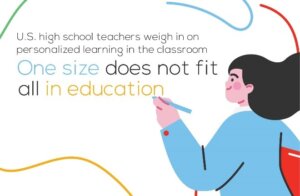
Seven in 10 high school teachers agree that a one-size-fits-all education, with the same curriculum and teaching methods for all students, is a thing of the past. In a recent survey conducted by OnePoll, more than half (51 percent) feel uncertain about their ability to impact their students’ performance in a traditional large-group classroom setting.
Most high school teachers (86 percent) are familiar with personalized learning, an alternative to traditional group learning that aims to customize learning for each student’s strengths, needs, skills and interests.
But educators point to challenges that prevent them from providing personalized education, such as lack of training by administrators and policies that restrict teacher autonomy with instruction. Plus, there is often limited access to technology and other resources that could support personalized learning and pressure to meet standardized test scores and curriculum requirements.
The teaching model we created 22 years ago emphasizes personalized instruction, combined with a flexible schedule, trauma-informed practices and job skills training. “We need to change up the structure of our classrooms for more collaboration and one-on-one teaching with our students,” said Shellie Hanes, superintendent of schools. “Teachers of personalized instruction find that their students are disciplined less, have fewer days of absence and are more engaged in school.”
We’re living in an age of personalization – from what we want to watch on TV and menu suggestions to virtual doctor visits and personalized exercise plans. Yet education delivery remains generalized to large groups, despite more and more students failing in that system. August is Personalized Learning Month, designed to bring more awareness of how personalized instruction can create much better student outcomes.
Survey methodology:
This random double-opt-in survey of 2,000 high school teachers was commissioned between April 5 and April 19, 2023. It was conducted by market research company OnePoll, whose team members are members of the Market Research Society and have corporate membership to the American Association for Public Opinion Research (AAPOR) and the European Society for Opinion and Marketing Research (ESOMAR).

